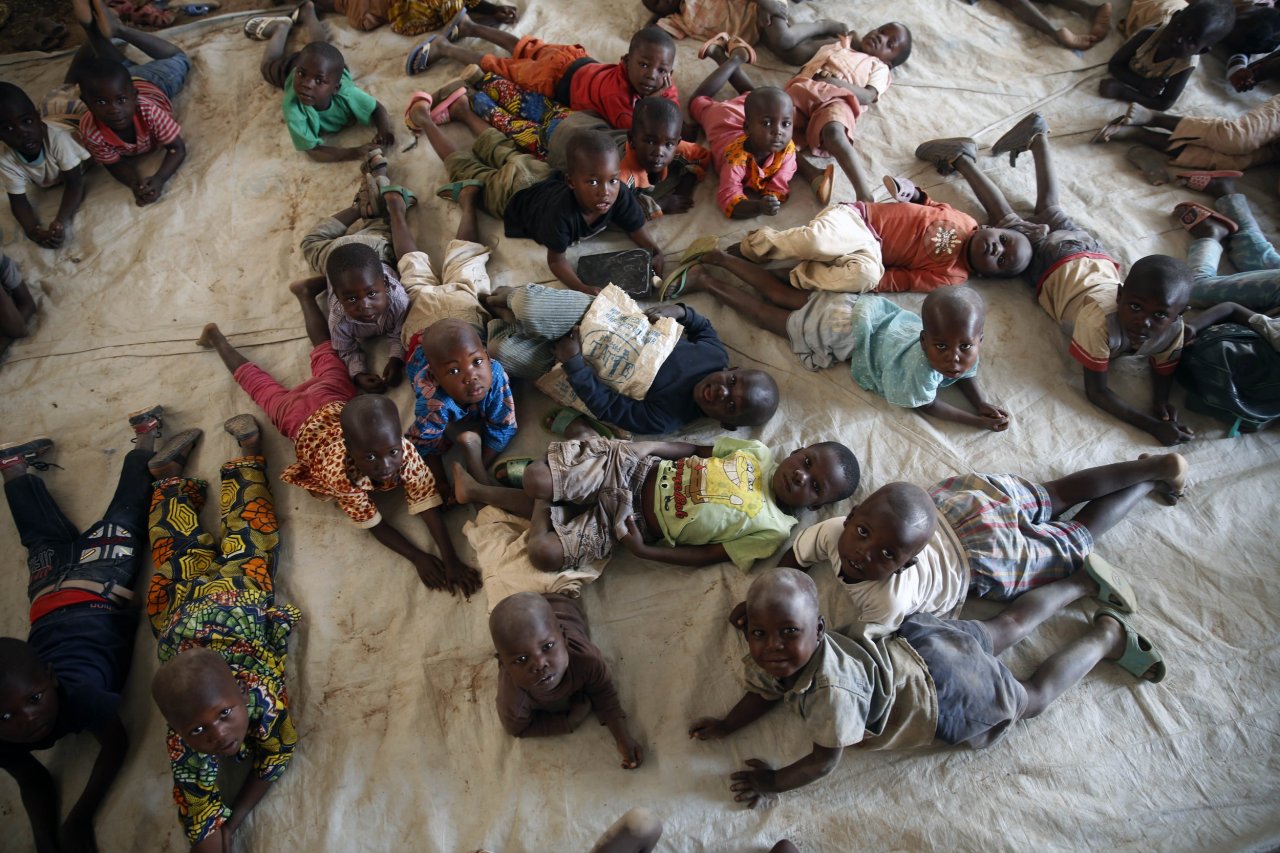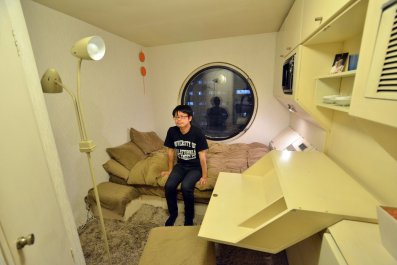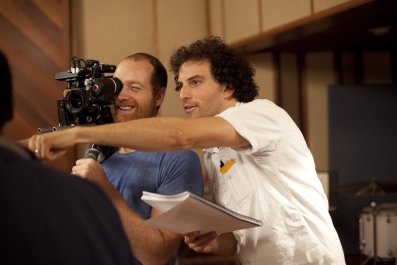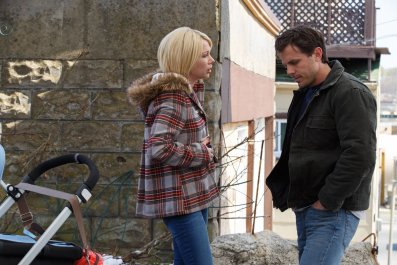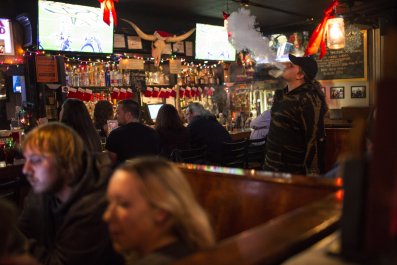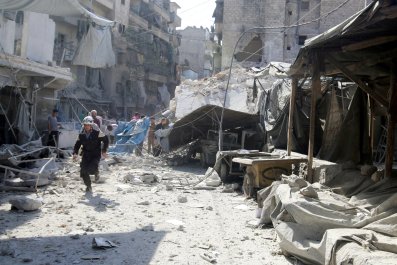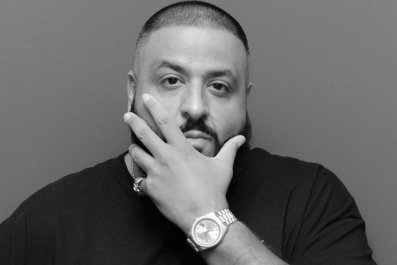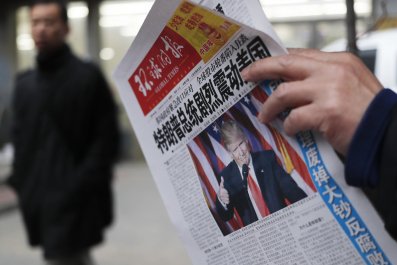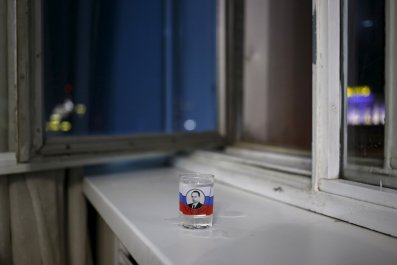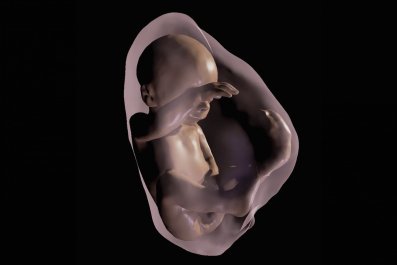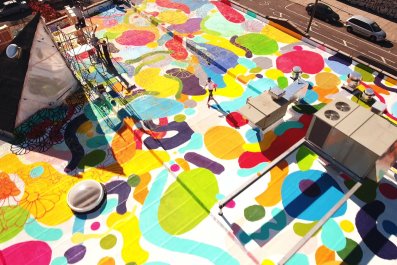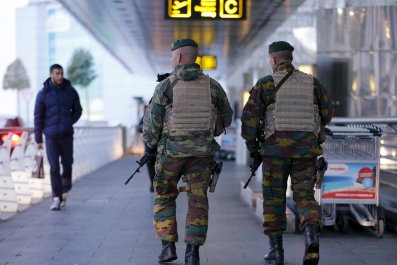The street children appear suddenly. Some emerge from the tall grass; others hop over a crumbling wall. Soon dozens of homeless kids and teenagers have assembled on the steps of an old, unused open-air stadium in Bangui, the capital city of the Central African Republic (CAR). Seven-year-olds sit down and tuck their bare legs inside their sweaters. Some of the older kids have legs pockmarked by scabs, burns and scars.
Many of these children are victims of the brutal ethnic conflict that racked their country for nearly four years. Some of them are also victimizers—former child soldiers who took part in the conflict. All of them are growing up in a country that the Commonwealth Secretariat—a U.K.-based organization—described in an October report as the worst place in the world to be young. Now child rights advocates and government officials are worried that these traumatized street kids could once again be pulled into war.
Although the government signed a peace agreement with 10 rebel groups in May 2015, armed gangs continue to sporadically launch violent attacks on civilians around the country. In the latest fighting, two groups clashed in November in the town of Bria, killing 85 people, injuring 76 and displacing nearly 11,000 others. Aid workers say the militias are likely to once again recruit CAR's children as the fighting flares.
During the conflict, armed groups often placed the children on the front lines and used them as "cannon fodder so that often they are the first to be killed," says Mohamed Malick Fall, UNICEF's representative in Bangui. Girls worked as sex slaves, porters or informers during times of conflict, and some minors have told U.N. investigators that armed groups forced them to kill their own parents during the recruitment process.
As part of the peace deal in 2015, 10 armed groups agreed to release all children under their control and pledged to stop recruiting child soldiers. UNICEF and other aid agencies provided support in rehabilitating those released children and returning them to their communities. But according to a recent U.S. State Department report, the CAR government has no effective program to disarm the militias and help fighters make a peaceful transition to civilian life.
Taking proper care of the street children, aid workers say, could prevent more young people from slipping back into the militias. The need appears urgent: One of the groups that promised to stop recruiting children soon re-enlisted the 150 youths it had released in January this year. "If you don't educate them or just leave them in the street," says Fall, "you see the risk the country is facing."
Thousands of civilians were killed during the conflict, and more than one-fifth of the population has, at different times, been forced to flee their homes. The Seleka rebel group raped, killed and pillaged their way to the capital in 2013, bringing about the country's fifth coup d'état in less than six decades of independence. That sparked vicious assaults under the pretext of revenge by the mainly Christian and animist anti-Balaka militia. Wearing voodoo amulets around their necks to summon what they described as magical powers, the anti-Balaka went on murderous sprees of their own, slitting the throats of thousands of Muslims and others, torching homes and slaughtering families. In 2014, U.N. officials warned that the violence had sown the "seeds of a genocide" in the war-ravaged country.
Making up almost half of the country's 4.7 million citizens, the CAR's children have suffered disproportionately in the years since the start of the conflict. In 2015, women and minors constituted 80 percent of the internally displaced, according to Save the Children. Armed groups recruited up to 10,000 boys and girls.
Read more: How Central African Republic can become a land of opportunity
Some aid agencies, including UNICEF and War Child UK, run rehabilitation programs to help children released from armed groups make the transition to civilian life. Often, such children can be violent "against themselves and against others," says War Child U.K.'s temporary country director, Jean-François Lepetit.
Regis Ngama-Gorongo, 19, and Bachir Niangso, 25, are trying to prevent the children from being lured back into the militias. Addressing the young people sitting on the crumbling steps of the old stadium, the two activists say they want to unite Bangui's youth to change the public's perception of them as "criminal street urchins," says Ngama-Gorongo, and to obtain "respect" and "help" in the form of educational and vocational training opportunities from the government and nongovernmental organizations.
Ngama-Gorongo ran away from home at the age of 8 to flee poverty and domestic abuse. It was a decision he did not at first regret, he says, because on the street food was actually easier to come by than at his family's dinner table. But his life has been tough ever since.
"Here in Bangui, our rights simply don't exist," he says to the assembled children and young people. Some call out in agreement, nodding their heads. "People treat us like bandits. They distrust us and sometimes beat us." The authorities, he adds, don't distinguish between hardened gangsters and those youths still trying to carve out a life for themselves. "They just call us all godobés [street kids] collectively, as if we are all criminals."
The main complaint of nearly all the homeless children in Bangui is their treatment at the hands of the local police, who the kids say use them as scapegoats for any crimes that take place in the city, arbitrarily arresting them and throwing them into jail for days at a time without charge. While being held in custody, Ngama-Gorongo says, the kids "don't get a thing to eat, and the water for drinking is filthy." During interrogations, the youths are "hit with wooden batons," he says, remembering his own experience behind bars a few years ago when he was picked up for theft along with several others—a crime he says he did not commit. "The guards have to be bribed in order to let the visitors in." (Government officials did not respond to request for comment for this article.)
In recent years, rights groups have investigated some police units in the CAR, saying they may have committed human rights abuses. In December 2015, a report by the United Nations Multidimensional Integrated Stabilization Mission in the Central African Republic described the arrest and beating of 21 street children by the Bangui-based Central Office for the Repression of Banditry unit. In June 2016, the CAR government, led by newly elected President Faustin-Archange Touadéra , forced the unit's director, Robert Yékoua-Ketté, to step down after Human Rights Watch implicated him in 13 cases of extrajudicial killings that took place over 11 months.
Earlier this year, a U.N. report on CAR corroborated "the direct involvement of Mr. Yékoua-Ketté in the violent assault and execution of a handicapped young male." The police have not yet investigated Yékoua-Ketté, who was previously a member of the Seleka.
CAR officials have a troubling history of exploiting and abusing street children. In his book Power and Obedience in the CAR , historian Didier Bigo describes how in the 1970s the country's then-infamous president, the self-proclaimed "Emperor" Jean-Bédel Bokassa, used street children as spies, rewarding them with money every time they uncovered one of his alleged enemies. Local activists say another of the country's former presidents, François Bozizé, used to reward street children by hosting them in his palace once a year. Bozizé, who was deposed in a coup d'état in March 2013 by the Seleka, would give them food, money and new clothes in exchange for information about any unusual movements they noticed around Bangui.
Even today, aid workers say, officials use the children in similar ways. "The street kids...know all the major personalities, all the cars. They are the eyes of the city," says Martial Pabandji, a communications specialist with UNICEF.
"It's easy to manipulate and use the street kids for violence," says Ali Ousman, a leader of the Muslim community in the CAR. "Nothing has been done for them over the years. The government could create structures for them, educate them, train them, put them into schools, but they prefer to use them in such sordid activities."
Some of the street kids are taking steps to show that they are not a threat to society. As part of a trust-building initiative, some homeless young people are now volunteering in Bangui's pediatric hospital. "This is a hospital which sometimes takes care of street children," Niangso explains. By getting the children to come in and clean a few hours a week, "they can also give something back."
But these gestures need to be met with educational and employment programs provided by the government, aid workers and youth activists say. If not enough help is provided to Bangui's street kids, says War Child's Lepetit, "the next armed group could be them."
Inna Lazareva was a 2016 fellow with the International Women's Media Foundation's African Great Lakes Reporting Initiative.



